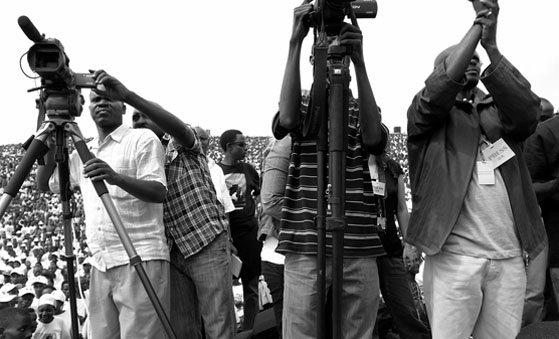
Rwanda needs to "get to grips" with a more open press following the re-election of president Kagame, according to a British journalist who produces a news wire from Kigali.
Graham Holliday, who runs the Kigali Wire spent a week on the campaign trail, working in tandem with a Reuters correspondent and photographer.
While he understands some of the government's aims to control the press, he said it is time for a more open media space.
"I think this is a problem that impacts Rwandan journalists more than foreigners," he told Journalism.co.uk. "However, it is definitely an issue for all journalists. It's something I hope Rwanda can get to grips with in the coming months and years. The government, quite rightly, points to the hideous role of hate media during the Genocide in 1994. They want to minimise the chances of that ever re-emerging. However, there are some very good arguments that the time is now right to start opening up the media space."
According to a report by allAfrica.com "government-censorship and self-censorship have become the norm" in Rwanda, where people fear a return to the hate media of the 1990s. But overall, Holliday feels the perceived image of Rwanda is a largely distorted view of reality.
"As regards safety, I had very few concerns It might sound like Rwanda is a dangerous place to live given it's horrific history, recent grenade attacks in Kigali, assassinations and suppression of the political opposition, but in general, and especially for foreigners, Kigali is a calm place to live. The biggest challenge for any reporter in Rwanda is separating rumour from fact. I lived in Vietnam for ten years where rumour, gossip and suspicion are normal, but Rwanda takes that concept up several notches, rungs and gradations of difficulty. And then some.
"This is an incredibly complex part of the world, a place that requires a lot of time in country to get to know, far more than anywhere else I've visited. And most media organisations simply do not have the resources to do this place justice, to really get to understand Rwanda."
Holliday, who has spent almost a year reporting on events in Rwanda, covered polling day on Monday using an iPhone and social media platforms to file images, video and news-bites from the ground. Working on his own wire gives him the freedom to document what he sees, he said, rather than the angle of an organisation.
"I'm not really reporting in the conventional sense, as I am not affiliated with any one news agency. I'm not looking to sell features and photography. I'm just trying to document what I see, where I see it, on Kigali Wire."
During the country's general election, Holliday was mainly using the wire to display his images of the events, taking around 400 shots a day, as well as blogging and aggregating news. As a whole, the site is also part of a wider experiment in the use of social media tools to distribute news on Rwanda.
"I distribute links, blog posts, images and occasionally video across 100 or more different social media sites. I've been doing this for a year now and while some sites garner zero connections or interest in Rwanda, others - like Twitter, Flickr, Moblog and Ipernity are quite highly engaged, particularly Twitter.
"I've found publishing in this manner is a good way to make yourself more visible and an excellent way to interact."
But the most important thing as a journalist reporting from foreign country, he adds, is to have a platform, whatever it may be, and add something interesting every day.
"Have someone interesting to talk to, somewhere interesting to go to, something interesting to write about, record, shoot, film, link to, and an outlet to file to, every single day.
"That's it. The outlet could be the New Yorker. Or it could be Twitter. Or both. But, that, in sum, as far as I see it, is it."
Free daily newsletter
If you like our news and feature articles, you can sign up to receive our free daily (Mon-Fri) email newsletter (mobile friendly).
Related articles
- Journalists are happy to be disconnecting from platforms, should news organisations be worried?
- Protecting journalists on social media, with Valérie Bélair-Gagnon
- What will your audience want in the future?
- 15 free sources of data on the media industry
- Predictions for journalism 2024: social media platforms and strategies









